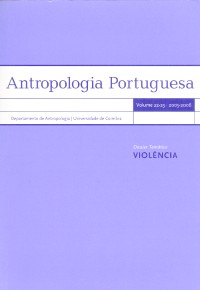Please use this identifier to cite or link to this item:
https://hdl.handle.net/10316.2/29259| DC Field | Value | Language |
|---|---|---|
| dc.contributor.author | Simões, Dora | - |
| dc.contributor.author | Mota, Paulo Gama | - |
| dc.contributor.author | Loureiro, Eugénia | - |
| dc.date.accessioned | 2014-02-11T17:04:12Z | - |
| dc.date.accessioned | 2020-09-15T08:02:27Z | - |
| dc.date.available | 2014-02-11T17:04:12Z | - |
| dc.date.available | 2020-09-15T08:02:27Z | - |
| dc.date.issued | 2006 | - |
| dc.identifier.issn | 2182-7982 | - |
| dc.identifier.uri | |http://hdl.handle.net/10316.2/29259 | - |
| dc.description.abstract | Child abuse is a dramatic phenomenon affecting in different ways all societies, being traditional or developed. Psychological, sociological and economic perspectives are known, although it remains difficult to characterize. An evolutionary approach provides a new conceptual framework allowing for an explanation of some relevant characteristics of child abuse and violence. This study tests the hypothesis that the presence of an adoptive parent is an important risk factor of children intra‑familiar maltreatment (Daly e Wilson, 1988a and b) as kinship between stepparent and children is absent, with aggressiveness inhibitory mechanisms being absent, unlike between parents and their offspring. Our sample included 100 cases of maltreated children, diagnosed by the Institute of Legal Medicine of Coimbra in 2002 and 2003 with ages between the 0 and the 16 years from the Center of the country. The results suggest that there is propensity for more violence in the reconstituted families, while the masculine element stands out as main aggressor. Violence hit victims of all ages and sexes, being more frequent in females between the 10 and 16 years, which suffered sexual abuses, generally severe. | eng |
| dc.description.abstract | A violência infantil é um fenómeno dramático que afecta, de formas diversas, todas as sociedades, tradicionais ou desenvolvidas. O fenómeno tem vertentes psicológicas, sociológicas e económicas conhecidas, embora permaneça difícil de caracterizar. Uma abordagem evolutiva oferece um novo quadro conceptual que permite explicar algumas características dos maus‑tratos infantis. Este estudo aplica a hipótese de que a presença de um pai adoptivo constitui um importante factor de risco de ocorrência de violência infantil intrafamiliar (Daly e Wilson, 1988a e b), porque o parentesco entre pai/mãe adoptivo e criança é nulo, não havendo, evolutivamente mecanismos inibitórios da agressividade entre indivíduos não aparentados, como os que existem entre parentes. A amostra incluiu 100 crianças maltratadas, diagnosticadas no Instituto de Medicina Legal de Coimbra, em 2002 e 2003, com idades compreendidas entre os 0 e os 16 anos. Os resultados sugerem haver maior propensão para a violência nas famílias reconstituídas, destacando‑se a figura masculina como principal agressor. A violência atingiu crianças de todas as idades e sexos, sendo mais frequente o abuso sexual em raparigas com idades compreendidas entre os 10 e os 16 anos. | por |
| dc.language.iso | por | - |
| dc.publisher | CIAS - Centro de Investigação em Antropologia e Saúde | - |
| dc.rights | open access | - |
| dc.subject | Child abuse | eng |
| dc.subject | parental investment | eng |
| dc.subject | parental attachment | eng |
| dc.subject | parental attachment | eng |
| dc.subject | family violence | eng |
| dc.subject | Maus‑tratos infantis | por |
| dc.subject | violência familiar | por |
| dc.subject | investimento parental | por |
| dc.subject | vinculação parental | por |
| dc.subject | solicitude parental | por |
| dc.title | “Cinderela”: do conto de fadas à realidade: perspectiva sobre os maus‑tratos infantis | por |
| dc.type | article | - |
| uc.publication.collection | Antropologia Portuguesa vol. 22/23 | - |
| uc.publication.firstPage | 119 | - |
| uc.publication.lastPage | 132 | - |
| uc.publication.location | Coimbra | - |
| uc.publication.journalTitle | Antropologia Portuguesa | - |
| uc.publication.volume | 22/23 | por |
| uc.publication.section | Vária | - |
| uc.publication.digCollection | IP | - |
| uc.publication.digCollection | B1 | - |
| uc.publication.orderno | 5 | - |
| uc.publication.area | Ciências Sociais | - |
| uc.publication.manifest | https://dl.uc.pt/json/iiif/10316.2/29259/232907/manifest?manifest=/json/iiif/10316.2/29259/232907/manifest | - |
| uc.publication.thumbnail | https://dl.uc.pt/retrieve/11473419 | - |
| uc.itemId | 71213 | - |
| uc.thumbnail.uri | https://dl.uc.pt/iiif-imgsrv/11473350/dl!3!15!82!18!1582184294363951617167321593395732866 | - |
| item.grantfulltext | open | - |
| item.fulltext | With Fulltext | - |
| Appears in Collections: | Antropologia Portuguesa | |
Files in This Item:
| File | Description | Size | Format | |
|---|---|---|---|---|
| ap22-23_artigo5.pdf | 5.05 MB | Adobe PDF |  |
Items in DSpace are protected by copyright, with all rights reserved, unless otherwise indicated.
